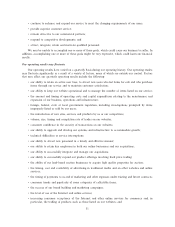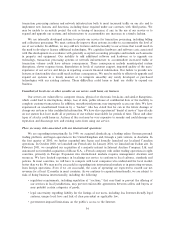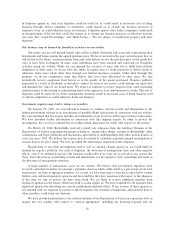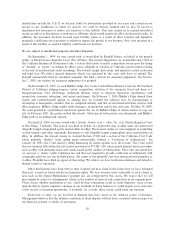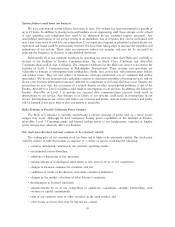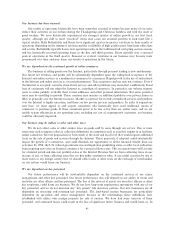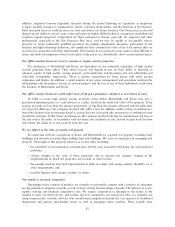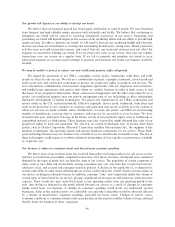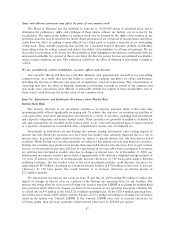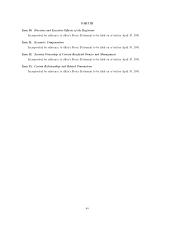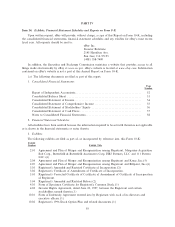eBay 2000 Annual Report Download - page 45
Download and view the complete annual report
Please find page 45 of the 2000 eBay annual report below. You can navigate through the pages in the report by either clicking on the pages listed below, or by using the keyword search tool below to find specific information within the annual report.In addition, the trading price of Internet stocks in general, and ours in particular, have experienced
extreme price and volume Öuctuations in recent periods. These Öuctuations often have been unrelated or
disproportionate to the operating performance of these companies. The valuations of many Internet stocks,
including ours, are extraordinarily high based on conventional valuation standards such as price-to-earnings
and price-to-sales ratios. The trading price of our common stock has increased enormously from the initial
public oÅering price. These trading prices and valuations may not be sustained. Any negative change in the
public's perception of the prospects of Internet or e-commerce companies could depress our stock price
regardless of our results. Other broad market and industry factors may decrease the market price of our
common stock, regardless of our operating performance. Market Öuctuations, as well as general political and
economic conditions, such as recession or interest rate or currency rate Öuctuations, also may decrease the
market price of our common stock. In the past, following declines in the market price of a company's
securities, securities class-action litigation often has been instituted. Litigation of this type, if instituted, could
result in substantial costs and a diversion of management's attention and resources.
New and existing regulations could harm our business
We are subject to the same federal, state and local laws as other companies conducting business on the
Internet. Today there are relatively few laws speciÑcally directed towards online services. However, due to the
increasing popularity and use of the Internet and online services, many laws relating to the Internet are being
debated at the state and federal levels (both in the U.S. and abroad) and it is possible that laws and
regulations will be adopted with respect to the Internet or online services. These laws and regulations could
cover issues such as user privacy, freedom of expression, pricing, fraud, content and quality of products and
services, taxation, advertising, intellectual property rights and information security. Applicability to the
Internet of existing laws governing issues such as property ownership, copyrights and other intellectual
property issues, taxation, libel, obscenity and personal privacy is uncertain. The vast majority of these laws
were adopted prior to the advent of the Internet and related technologies and, as a result, do not contemplate
or address the unique issues of the Internet and related technologies. Those laws that do reference the
Internet, such as the Digital Millennium Copyright Act, are only beginning to be interpreted by the courts and
their applicability and reach are therefore uncertain. In addition, numerous states, including the State of
California, where our headquarters are located, have regulations regarding how ""auctions'' may be conducted
and the liability of ""auctioneers'' in conducting such auctions. No Ñnal legal determination has been made
with respect to the applicability of the California regulations to our business to date and little precedent exists
in this area. Several states are considering imposing these regulations upon us or our users, which could harm
our business. In addition, as the nature of the products listed by our users change, we may become subject to
new regulatory restrictions.
Several states have proposed legislation that would limit the uses of personal user information gathered
online or require online services to establish privacy policies. The Federal Trade Commission also has settled
several proceedings regarding the manner in which personal information is collected from users and provided
to third parties. Changes to existing laws or the passage of new laws intended to address these issues could
directly aÅect the way we do business or could create uncertainty on the Internet. This could reduce demand
for our services, increase the cost of doing business as a result of litigation costs or increased service delivery
costs, or otherwise harm our business. In addition, because our services are accessible worldwide, and we
facilitate sales of goods to users worldwide, foreign jurisdictions may claim that we are required to comply with
their laws. For example, a French court has recently ruled that a U.S. website must comply with French laws
regarding content. As we have expanded our international activities, we have become obligated to comply with
the laws of the countries in which we operate. Laws regulating Internet companies outside of the United
States may be less favorable then those in the United States, giving greater rights to consumers, content
owners and users. Compliance may be more costly or may require us to change our business practices or
restrict our service oÅerings relative to those in the United States. Our failure to comply with foreign laws
could subject us to penalties ranging from Ñnes to bans on our ability to oÅer our services.
40



